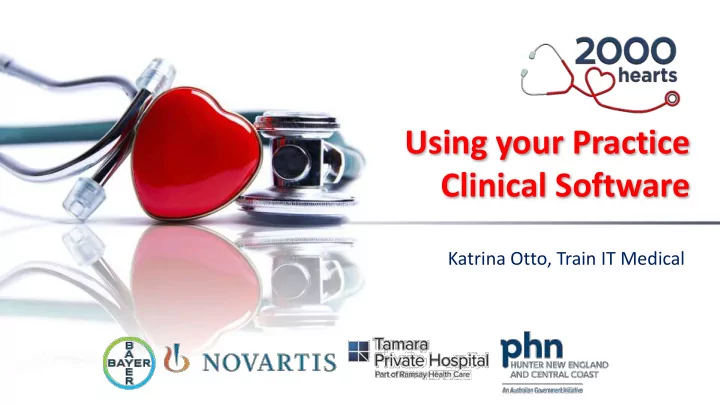

Using your Practice Clinical Software Katrina Otto, Train IT Medical
Objective: Record data in practice software to improve identification of patients at risk of cardiovascular disease.
Improve health outcomes Improve revenue Improve relationships Improve data
Identifying risk • S moking • N utrition • A lcohol • P hysical activity level • Blood pressure • Pathology / Serum lipids • Waist circumference and BMI • Family history of premature CVD • Social history & social determinants of health
Data to identify risk
Entering data
Other risk factors Related conditions: • Diabetes • Chronic Kidney Disease • Familial hypercholesterolaemia • Evidence of atrial fibrillation
Ken’s ‘Past History’ list Add important detail in Comment
Coded diagnoses ONLY for Chronic conditions & significant active or inactive ‘events’ eg cabg BEST TIP!! Add detail/comment eg Care team involved
Download the ‘Data Quality’ Checklist
Ken’s medications
Cardiovascular risk calculators
Physical Activity Script
Care Plans & Health Assessments
ACCREDITATION Criterion Q1.1 – Quality Improvement Activities
Analyse data within your software
Data reports to drive improvements
Pen CS Download PEN CS PIP QI booklet
TopBar for continual improvements
What is our GOAL (what are we trying to accomplish) Raise Awareness of Clinical Coding What measures will we use? (i.e. data) Data Extraction Tools eg. Pen CAT or POLAR What ideas can we use? List ideas here to work on in table below Start a Quality improvement folder (how are we going to achieve our goal) Team meeting Organise education eg. webinars / face to face sessions Post-education follow-up team discussion GP & RN team review of clinical documentation (opportunistic or planned) Pen CAT / Polar Data Quality Audit PLAN DO STUDY ACT IDEAS How will we do it – who, Did we do it What happened? What is our next step? what, where and when? 1. 2. 3. 4. 5.
‘Actions’ • Recheck BP • Ask about smoking • Record weight
Actions
Reminders & Recalls REMINDERS eg. health assessment RECALLS - clinically significant eg abnormal result
A systematic approach! 1. Improve patient engagement. 2. Code and routinely update data. 3. Use software to help identify patients at risk. 4. Screen proactively. 5. Improve your recall and reminder system. 6. Improve efficiency of care plan & health assessment templates 7. Lead your team in continual quality improvements.
Thanks for inviting me! KATRINA OTTO: katrina@trainitmedical.com.au Twitter: trainitmedical . Facebook: trainitmedical www.trainitmedical.com.au Access more free practice resources & blog posts Subscribe to my blog
Recommend
More recommend